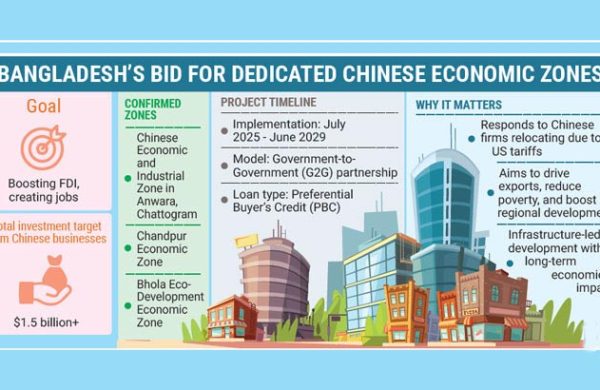Govt plans exclusive EZs for Chinese investment worth $1.5b
- Update Time : Thursday, April 24, 2025

Staff Correspondent:
The interim government is planning to set up exclusive economic zones for Chinese investors, in a move to boost foreign direct investment (FDI) and strengthen economic ties with China.
The initiative aims to attract over $1.5 billion in investment and generate thousands of local jobs.
The Bangladesh Economic Zones Authority (BEZA) has already earmarked three sites – one in Anwara upazila of Chattogram, and two more proposed in Chandpur and Bhola – for development under a government-to-government (G2G) arrangement with China.
“This isn’t just about land or infrastructure. It’s about building livelihoods, creating jobs, and bringing long-term benefits to the local communities,” a senior BEZA official.
The most advanced of these is the Chinese Economic and Industrial Zone (CEIZ) in Anwara, where 800 acres have been allocated.
The Chief Adviser’s Office has prepared a development project proposal (DPP) titled “Supporting Infrastructure Project for Chinese Economic and Industrial Zone”, which has been submitted to the Planning Commission for approval by the Executive Committee of the National Economic Council (ECNEC).
According to the proposal, the project will cost Tk4,056.14 crore. Of this, Tk1,920 crore will be funded by the Bangladesh government, while Tk2,136.15 crore is expected to come as Chinese project assistance, under the preferential Buyer’s Credit scheme.
BEZA has nominated China Road and Bridge Corporation (CRBC) to lead the construction of infrastructure in the Anwara zone. Work is scheduled to begin in July 2025 and continue through June 2029.
Planned facilities include a 1.2-kilometre link road, jetty access, a large treated water reservoir, a district gas regulating station, and a 25 MLD central effluent treatment plant – measures expected to ensure a fully functional industrial hub.
In parallel, two more zones are being pursued: the Chandpur Economic Zone (CEZ), to be developed by China’s state-owned Power Construction Corporation (PowerChina), and the Bhola Eco-Development Economic Zone, which will be developed privately by Leez Fashion Industries Limited, a Chinese firm operating in Bangladesh.
Officials believe these zones will appeal to Chinese companies seeking alternatives amid shifting global trade dynamics, particularly in the wake of US tariffs on Chinese exports.
“This project is not just about infrastructure – it’s about creating jobs, reducing poverty, boosting exports, and uplifting the local economy,” said a BEZA official.
The CEZ in Chandpur is projected to cost Tk3,306 crore, with around Tk2,370 crore allocated for road infrastructure and Tk541.55 crore for power distribution.
Meanwhile, the Bhola zone is expected to attract investment in garments, textiles, electronics, and ceramics, potentially creating up to 40,000 jobs.
The government hopes the zones will not only bring in capital and technology but also serve as a model for future industrial development across the country.















